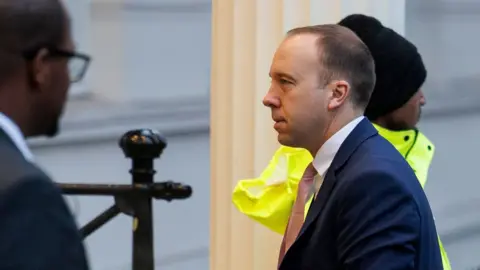Covid inquiry: Lockdown should have been three weeks earlier - Hancock
Entering lockdown three weeks earlier would have cut deaths in the first Covid wave by 90%, former health secretary Matt Hancock has said.
Mr Hancock told the Covid inquiry that with the benefit of hindsight the UK should have locked down much sooner.
He also said a "toxic culture" existed in government driven by Dominic Cummings, the PM's chief advisor.
But he denied accusations he lied to colleagues during the pandemic.
Mr Cummings - who left No 10 in December 2020 after falling out with then PM Boris Johnson - has been particularly scathing of Mr Hancock.
Offered a chance to respond, Mr Hancock called Mr Cummings a "malign actor" who subjected Health Department staff to abuse as they grappled with the emergence of Covid.
He argued it was having to do the work of other departments, for example on school closures, and that its "hard work" was hindered by "a toxic culture that we had to work with".
He said Mr Cummings sought to grab power from Mr Johnson while shutting out ministers from key meetings.
There was an "unhelpful" assumption that "when anything was difficult or a challenge... there was somehow fault and blame", Mr Hancock said.
The West Suffolk MP was health secretary from 2018 until June 2021, when he was forced to resign after breaching Covid guidance.
He was suspended as a Conservative MP, after appearing on ITV's I'm a Celebrity Get Me Out of Here in 2022 and later said he would not stand for re-election.

More on Covid and the Covid Inquiry

During his testimony Mr Hancock said "many, many lives" could have been saved if the UK government had initiated the first coronavirus lockdown around 2 March 2020, rather than 23 March.
However, he stressed that there was still "enormous uncertainty" and only 12 cases had been identified in the country by this point.
He told the inquiry he was speaking with "hindsight" and robustly defended his role in the pandemic and that of the department he led.
"From the middle of January, we were trying to effectively raise the alarm," he said, adding: "We were trying to wake up Whitehall to the scale of the problem."
Not 'adequate'
Pushed on when he advised Mr Johnson that immediate action would be needed to contain the virus, Mr Hancock said he raised the alarm bell on 13 March.
However, the inquiry's lawyer, Hugo Keith KC, questioned the statement, noting that this was not mentioned in the entry for 13 March in Mr Hancock's book, Pandemic Diaries.
Mr Hancock replied that the evidence only came to light after his diary was published and cited an email he sent the prime minister calling for a "suppression strategy".
Mr Keith argued that this did not amount to calling for an immediate lockdown.
Asked about the existence of pre-prepared plans for a pandemic, Mr Hancock said they existed but repeated his previous assertion that they were not "adequate".
Mr Hancock will continue his evidence on Friday.
Mr Johnson will give evidence to the inquiry on 6 and 7 December. Prime Minister Rishi Sunak is also expected to give evidence before the end of the year.
 EPA
EPAThe inquiry has been bruising for the politician, with past witnesses accusing Mr Hancock of "nuclear levels" of overconfidence and a lack of honesty.
Helen MacNamara, a senior civil servant during the pandemic, said he would say things that would turn out not to be the case.
Sir Patrick Vallance, the former chief scientific adviser, said Mr Hancock had "a habit of saying things which he didn't have a basis for".
Mr Hancock said there was no "evidence whatsoever" that he lied during the pandemic.
In the session, the inquiry was shown extracts from Sir Patrick's diary which described a "massive internal mess" inside the health department and reported that then-civil service head Sir Mark Sedwill complained of the department's "clear lack of grip".
Government response
Mr Hancock has been criticised for saying in the early days of the pandemic that a "protective ring" had been thrown around care homes.
He said he used that phrase to refer to actions including giving the sector £3bn and providing protective equipment.
However, he appeared to agree with suggestions that the protections did not amount to "an unbroken circle".
He also told the inquiry that he did not know about the "Eat Out to Help Out scheme" - whereby the government subsidised people to go to restaurants in the summer of 2020 - until the day it was announced.
He acknowledged he had concerns about how it impacted infection rates, however he said he did not express those publicly because he abided by "collective responsibility".
'Greatest regret'
Mr Hancock was also questioned about apparently contradictory evidence on when the government knew people without symptoms could transmit the virus.
Referring to a report by the US's Centre for Disease Control, he said there was not clear evidence until the beginning of April and up to then he had been advised not to base policy on the assumption that transmission could be asymptomatic.
Mr Hancock said it was his "single greatest regret with hindsight" that he didn't overrule the advice.
"I was in the pro-let's worry about asymptomatic transmission camp. The frustration was that, understandably from their point of view, and here I'm putting myself in their shoes, the Public Health England scientists said we have not got concrete evidence."
The inquiry was shown messages between Chief Medical Officer Sir Chris Whitty and Sir Patrick in which they suggest the government had known about asymptomatic transmission.
Posting on X as the inquiry was going on, Mr Cummings said Mr Hancock was "talking rubbish".
